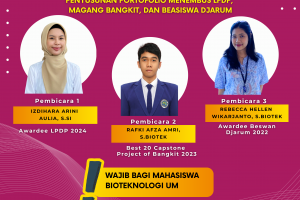ENCOURAGING KEBONDUREN RESIDENTS TO ENGAGE IN ENTREPRENEURSHIP: TURNING PINEAPPLE PEELS INTO TEPACHE DRINKS TO SUPPORT SDGS 3, 7, 8, AND 15
COMMUNITY SERVICE: Biotechnology Study Program Team Trains Kebonduren Village Women to Make Tepache Drinks
A team of lecturers and students from the Biotechnology Study Program, Faculty of Mathematics and Science Universitas Negeri Malang (UM) conducted a training session on making tepache drinks from pineapple peels in Kebonduren Village, Ponggok District, Blitar Regency. The event, held on Saturday (13/7) at the Kebonduren Village Office, was attended by empowerment and family welfare. This activity supports SDGs 3, 7, 8, and 15.
Mrs. Sukarman, the head of empowerment and family welfare, expressed that this training was highly anticipated as it provided new ideas to the empowerment and family welfare women for innovating with the abundant and easily accessible pineapples in Kebonduren Village. Up until now, pineapples in Kebonduren Village have only been consumed as fresh fruit, with the unsold ones used as livestock feed, thus ensuring sustainable land ecosystem utilization, maintaining a clean environment, and being affordable (supporting SDGs 7 and 15). Therefore, the community service team, led by Ratna Juwita, Ph.D., innovated by turning pineapple peels into tepache drinks, which are popular among all age groups and can be enjoyed at any time. “This tepache drink can maintain digestive health, making it good for daily consumption, supporting SDG 3,” she said.
The tepache drink-making training from pineapple peels also provided new entrepreneurial ideas, opening up job opportunities and boosting economic growth, especially in Kebonduren Village (supporting SDG 8). The empowerment and family welfare women of Kebonduren Village, were very enthusiastic about the training and guidance, as evidenced by the many questions posed by the training participants. Each participant received a brief tutorial on how to make tepache drinks from pineapple peels. Ratna hopes that after the training, the empowerment and fFamily welfare women can practice it at home and that it can eventually become a small business product of Kebonduren Village. “We also provided samples of our self-produced tepache on a small scale to all training participants,” she added. Ratna also hopes that this training activity can enhance the skills of empowerment and family welfare women in Kebonduren Village. “From the survey results filled out by the participants, it shows positive feedback, as they feel they have gained additional skills with new knowledge they had never known before,” she concluded.




